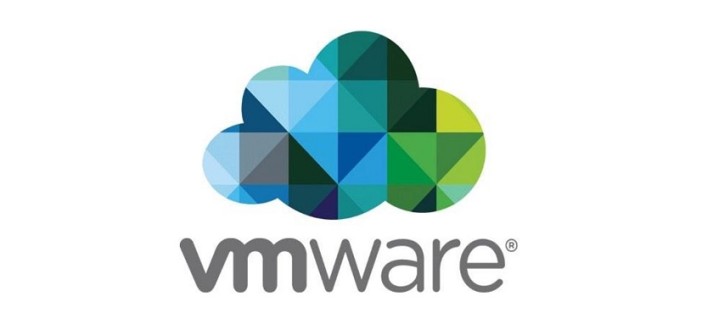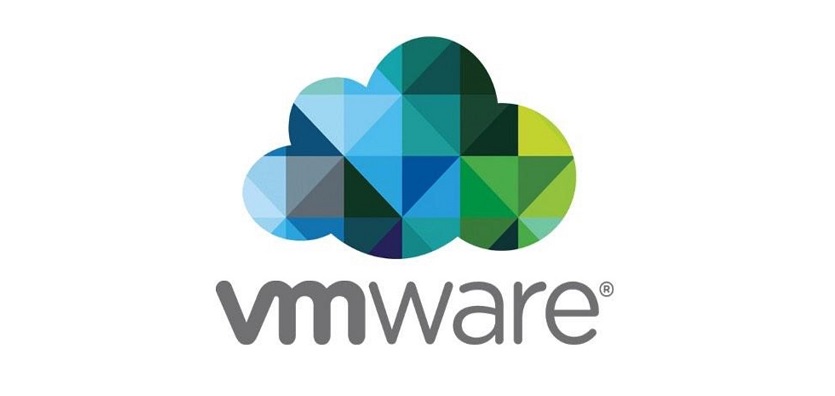
- Study conducted by Forbes Insights for VMware highlights a disconnect between CIOs and end-users in the APJ region on the availability, utility and freedom to use employee technologies in the workplace
- This disconnect, if unaddressed, has the potential to impede employees’ personal productivity and effectiveness, thereby impacting a company’s bottom-line and ability to retain top talent
VMware, a leading innovator in enterprise software, in collaboration with Forbes Insights, has revealed new Asia-Pacific and Japan (APJ) findings from a study on the impact of business apps on employee and business performance. The research highlights that while APJ organizations are actively deploying business apps, their employees feel that more can be done to increase the accessibility of employee technologies in the workplace to enhance company performance and secure future growth. This situation is the result of a disconnect between CIOs and end-users, which must be addressed in a business environment that is experiencing intense competition for skilled talent, geographically dispersed frontline staff and a greater demand for collaboration and job satisfaction.
The research, titled “The Impact of The Digital Workforce: The New Equilibrium of the Digitally Transformed Enterprise”, surveyed 2,150 global CIOs and frontline staff in large enterprises on how the use, availability and access to business apps is affecting their work and their companies. Respondents from Australia, China, Japan and India were included in this research.
Businesses driven by employee initiative and management trust – by granting employees greater access to the apps they prefer and need to do their jobs – are benefiting from faster decision making, increased productivity, better collaboration and higher staff satisfaction, according to the research.
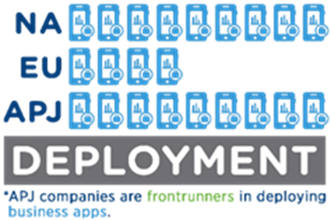 APJ companies are ahead of European companies and on par with North American companies in providing employees with the apps they need and making them readily accessible.
APJ companies are ahead of European companies and on par with North American companies in providing employees with the apps they need and making them readily accessible.- However, while 39 percent of APJ CIOs believe that they are deploying the apps their employees need, only 24 percent of APJ end-users believe they have access to the apps they need. This highlights a significant difference between CIOs rolling out business apps and employees’ ability to actually use these apps.
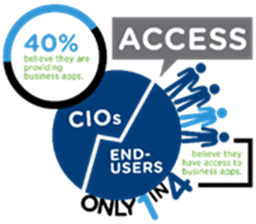 For example, less than one-third of APJ end-users believe that business apps are readily accessible to employees on all devices.
For example, less than one-third of APJ end-users believe that business apps are readily accessible to employees on all devices.
“More than before, across the APJ region, we’re seeing employees, especially frontline staff, work and engage with customers remotely. When doing so, having access to critical information anytime, anywhere and on the devices and apps they choose can make a difference in effective customer engagement and productivity,” said Sanjay Deshmukh, vice president, End-User Computing, APJ, VMware. “CIOs must therefore consider how they can orchestrate the adoption of employee technologies, not simply for the sake of it, but for real and effective use. If employees can take decisive and effective action and enhance their personal performances, it will no doubt benefit the companies where they work.”
Key APJ Findings:
- Digital Transformation is Driving a Shift in Management Environment and Culture
- Digital transformation, particularly through highly accessible employee-centric apps and productivity suites, is forcing management to adjust to a new equilibrium within the enterprise.
- This rebalancing can give frontline employees the tools and the freedom they need to innovate and execute. It requires investment in an underlying digital platform and mindset that enables management to move from a “command and control” workstyle to one of “trust, encouragement and support.”
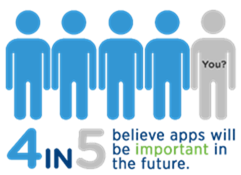 Companies leveraging business apps are seeing a strong impact on workforce morale. Apart from helping to improve human resources operations like recruitment, retention and onboarding, APJ employees said that apps are improving their job satisfaction and making their company a better place to work. When looking forward to the role of business apps, four in five respondents believe apps will be either ‘important’ or ‘very important’ in the future.
Companies leveraging business apps are seeing a strong impact on workforce morale. Apart from helping to improve human resources operations like recruitment, retention and onboarding, APJ employees said that apps are improving their job satisfaction and making their company a better place to work. When looking forward to the role of business apps, four in five respondents believe apps will be either ‘important’ or ‘very important’ in the future.- Apps dramatically improving job satisfaction among employees in APJ. Respondents in India and China report the most dramatic improvements, with 42 percent and 26 percent strongly agreeing that apps have improved their work life, followed by Australia at 15 percent.
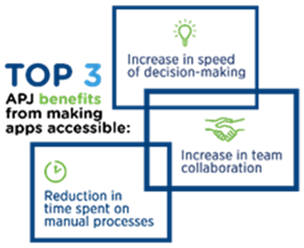 As Employees Become More Empowered, They Become More Productive
As Employees Become More Empowered, They Become More Productive
- Business apps and productivity solutions are driving a fundamental transformation in the individual employee’s workday, increasing workplace efficiency. Respondents in India reported the highest rate of workplace efficiency improvement (16 percent), followed by China and Japan at 13 percent.
- APJ end-users indicated that apps lead to significant reductions in the time they spend on manual processes. Emerging markets like India (18 percent) and China (15 percent) saw a significantly higher reduction as compared to developed markets like Australia (13 percent) and Japan (13 percent).
- In less-developed economies, such as China and India, the adoption of highly-automated, user-friendly business apps is disrupting the old ways of work and enabling employees to leap ahead in productivity and efficiency.
- Making Business Apps Accessible – From Any Device – is the Performance Differentiator:
- APJ respondents believe that accessible apps can have a significant impact on the revenue growth of the firm. On average, local CIOs believe business apps are very important to increasing their overall revenue:
- APJ – 59 percent
- Australia – 53 percent
- China – 52 percent
- India – 92 percent
- Japan – 43 percent
- APJ respondents believe that accessible apps can have a significant impact on the revenue growth of the firm. On average, local CIOs believe business apps are very important to increasing their overall revenue:
- They also attribute past growth to business apps, agreeing or strongly agreeing that employee business applications have helped their firm increase revenues:
- APJ – 76 percent
- Australia – 65 percent
- China – 83 percent
- India – 90 percent
- Japan – 68 percent
- Overall, APJ companies that make apps available to employees when and where they need them reported higher performance at the employee- and enterprise-levels.
- 17 percent reduction in time employees spend on manual processes
- 16 percent increase in speed of decision-making
- 16 percent increase in team collaboration
- 12 percent increase in productivity
“Employees are taking control of their own performance and, in turn, improving their companies’ bottom lines. They are adopting whichever business apps they need and starting a quiet revolution from within. The downside is the emergence of silos of innovation. CIOs must respond in kind by implementing effective collaboration, device management and enterprise security,” said Deshmukh. “As CIOs in the APJ region look to stitch together these silos, VMware is addressing this business need through a digital workspace platform that delivers the apps and data employees need, accessible on any device.”
About “The Impact of the Digital Workforce: The New Equilibrium of the Digitally Transformed Enterprise” Report
The survey was conducted from June to August of 2017 by Forbes Insights, in collaboration with VMware. The survey targeted 2,150 executives, which were equally divided between CIOs and end-users of business apps. The respondents were drawn from 16 countries, including Australia, China, India and Japan, 12 different industries, and companies with a minimum of US$250 million in revenue.
About Forbes Insights
Forbes Insights is the strategic research and thought leadership practice of Forbes Media, a global media, branding and technology company whose combined platforms reach nearly 94 million business decision makers worldwide monthly. By leveraging proprietary databases of senior-level executives in the Forbes community, Forbes Insights conducts research on a range of topics to position brands as thought leaders and drive stakeholder engagement. Research findings are delivered through a variety of digital, print and live executions, and amplified across Forbes’ social and media platforms.
About VMware
VMware software powers the world’s complex digital infrastructure. The company’s compute, cloud, mobility, networking and security offerings provide a dynamic and efficient digital foundation to over 500,000 customers globally, aided by an ecosystem of 75,000 partners. Headquartered in Palo Alto, California, this year VMware celebrates twenty years of breakthrough innovation benefiting business and society. For more information, please visit www.vmware.com/company.html.

